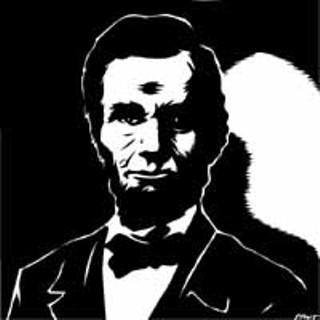Letters @ 3AM
Notes for 'The Founders' -- A Poem
By Michael Ventura, Fri., Oct. 4, 2002

Lincoln preferred to read aloud even when alone -- perhaps to be sure that all the conflicted parts of himself would hear. Place that image somewhere in this poem, The Founders -- an ironic title. The point is: They had no idea what they were founding. Zip. None. As to form: Try a structure like Duke Ellington's in his longer compositions: alternating themes that relate to each other but go their own ways, their connections strong but oblique. As Whitman taught, a wild culture on a vast continent can't be expressed in strict forms. For the first theme (run it four tabs in on the page) keep an even pace, four-line verses, set in Washington, D.C. The opening lines: A shining black wall names the dead. A stone mirror./To read this wall you must see yourself./Your reflection sinks/Into the polished rock, where you cannot call it back.
The second theme (indented two tabs in) employs longer lines and richer syntax. Descriptive passages. Let the landscape serve as symbol. (Landscape is moral, Stanley Crawford wrote in that brilliant, all-but-lost novel Travel Notes.) Write of that road in the Mojave where the high school kids have written their names by lining up small stones along the roadside -- miles and miles of rock names in the middle of nowhere. (Contrast with the Vietnam Memorial.) Write of lightning-struck trees in the wilderness of southern Utah; the surreal rock formations in Arizona; the lava flow in New Mexico where the rocks are still sharp enough to cut your shoes; and seashells embedded in the thousands of desert stones near Big Bend. A primeval country -- that's the theme.
The third theme (flush left) employs longer lines and a looser prose syntax. That's where the Founders appear in person, approachable only in the context of a government that's abandoned them and a primeval landscape that they never even saw. We've forgotten how hard those men studied, as though they'd readied themselves all their lives for the task of creating a country. (Most read Latin, French, and Greek.) Passages like: What could be as audacious/as the creation of a nation out of words?/What greater faith than theirs: that if they spoke/the necessary sentences, a republic would cohere around their statements?/It was an act of incantation. And it worked, their spell./They couldn't guess -- /their precious Enlightenment left them, after all that study, unprepared -- /with their trust in reason they could not guess/that to free the political human being/was also to free the psyche./Which is without boundary.
Important to include a little detail rarely mentioned about the gathering that declared our independence: Several noted, in their letters home, the viciousness of the horseflies -- swarms of flies, impossible to escape, biting through their thick stockings. Imagine those passionately reasoned deliberations amid incessant itching, infuriating buzzing, constant scratching and swatting. The flies, of course, are absent in the famous painting of the Signing. But maybe the universe was trying to tell them something? Work in Melville's verse: But the Founders' dream shall flee./Age after age shall be/As age after age has been...
Jefferson was 32 when he penned the pursuit of happiness. He had yet to fall in love with his slave, Sally Hemmings -- had yet to discover the irreconcilable distance between his reason and his happiness. (When in the course of human events ... What a strange, almost awkward, phrase: human events. As opposed to events that are more or less than human, or not human at all -- fly events, for instance?) Fitting that Poe was born in the last year of Jefferson's presidency. He was first to understand that political freedom would result in the unleashing of the human psyche -- the very force that all previous systems had existed to control. It scared him, quite literally, to death.
Hawthorne was born in the third year of Jefferson's presidency. The Transcendentalists hated Hawthorne's stuff (Emerson said his stories were "good for nothing") because Nathaniel saw what was coming: Against all Puritan strictures, the tormented minister would couple with the daring Hester to create the future -- demonic little Pearl. Pearl will not be contained. Her descendants will sport nose-rings and tattoos. Forget the letter "A" -- it would take the entire alphabet to signify their instructive, fruitful, destructive sins. Destructive of themselves, yes, but also of the money-grubbing complacency that turned the pursuit of happiness into the Great American Mall.
Include this: Melville and Whitman were born in 1819, the year John Adams wrote to Thomas Jefferson: "Is liberty a word void of sense? If it is ... there can be neither reward nor punishment in the universe." To which Melville would add years later: Seeking to acquire a larger liberty, man but extends the empire of necessity. Hawthorne and Melville knew what Poe knew, and feared as he did. Whitman knew it too, but never feared: What is called good is perfect, and what is called sin is also perfect ... I am a dance ... Play up there! The fit is whirling me fast. Few but Pearl are willing to dance with him. And the future is always the Pequod, sinking again and again. (Here's a place for two short four-line verses: "On September 11, 2001,/A Pequod/Was sunk/By a whale. //// Hester Prynne/Jumped from the South Tower/Holding the hand/Of Henry James.")
Let the next passage record those lightning-struck trees in Utah (there are so many!), and include Whitman's "Open Road": It is provided in the essence of things that from any fruition of success, no matter what, shall come forth something to make a greater struggle necessary.
Note that Lincoln, like Poe, was born in the last year of Jefferson's presidency -- and how Lincoln would have hoped that his descendants were resourceful enough to forge new words for their disasters, instead of quoting him on the anniversary of September 11. He stood at Gettysburg in more pain than we imagine -- for he was Commander and Chief, it was on his order that these men had died (on both sides). Lincoln didn't look back a century and a half to find words; given his complicity, he felt a responsibility to speak his own. Our present leaders admit neither complicity nor responsibility. Lincoln would have found that inexpressibly disappointing.
Is there a way to work in Melville's passage from The Encantadas? Given these historical origins and social sources, these current grounds of spirit and pathways of hope, how might we secure the faith that our imperial-minded republic, unlike its ancient homologues, will not commit its energies in immense genocidal gulps at the expense, one time or another, of all the major colors, types and varieties of mankind? And certainly include how, during the War of the Rebellion (as Lincoln called it), Walt Whitman would walk early in the morning to the hospital where he nursed the ill, wounded, and dying. Lincoln often went for a carriage ride (escorted by some cavalry) at the same time. Lincoln didn't know who Whitman was, but the two became familiar sights to each other, and took to touching the brims of their (very different) hats, nodding and smiling by way of greeting. (If I could be anywhere at anytime, there I'd be -- to witness, just once, the smile that passed between Abe Lincoln and Walt Whitman ... while it was still possible to believe that our republic might mirror them.)
Miss Emily, as I always call her, is as much our Founder as anyone. So: a passage in the descriptive section about Hannah and I reading Emily Dickinson to each other in that motel in Arizona. No one ever was wilder than Miss Emily. In the same year that Whitman and Lincoln shared a smile, and as so many men were dying, Miss Emily wrote: But since we got a Bomb --/And held it in our Bosom -- /Nay -- Hold it -- it is calm -- Telling of the mob within the heart/Police cannot suppress. And, near the end of her brief life: Rearrange a 'Wife's affection!/When they dislocate my Brain!/Amputate my freckled Bosom!" And: Some say goodnight -- at night -- I say goodnight by day -- Goodbye -- the Going utter me -- Goodnight, I still reply.
Good night, dear lady. I will eke out the poem in fits and starts, the way I eke out all my writing these days -- all but these columns, where deadlines push me toward something approaching coherence. If I'm less coherent tonight, sketching this mosaic of impressions, it's because it's never been more clear that the America of our hearts is a forgotten country, overwhelmed by the America of our fear and greed. What can today's Americans make of Jefferson's words to Adams, August, 1820: When once we quit the basis of sensation, all is in the wind. ![]()








